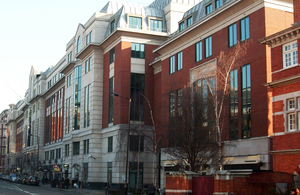Devolution of local transport
Local communities and businesses could be given control of decisions and budgets for major local transport schemes in their areas.

Local communities and businesses could be given control of decisions and budgets for major local transport schemes in their areas, under proposals announced for consultation by Transport Secretary Justine Greening today (31 January 2012).
The new system could potentially see decisions on capital funding for local schemes - including new local roads, public transport schemes, better pedestrian routes, and new local rail stations - devolved to democratically accountable local transport bodies.
Currently central government must approve all schemes over £5 million. The government is proposing that from 2015 local transport bodies will be able to decide for themselves how to spend their money on priorities best suited to their local needs without Whitehall approval.
Transport Secretary Justine Greening said:
We want a system that is much more responsive to local needs and it makes good sense to give local residents and passengers a greater say in the transport infrastructure that they rely on so much.
These proposals could hand real power to communities so they can make locally accountable decisions on what transport improvements are needed in their area. This is a key plank to our localism agenda, freeing local authorities from central government control, so I look forward to responses from across the country.
The primary role of local transport bodies - involving both Local Enterprise Partnerships and local authorities - would be to agree, manage and oversee the delivery of a prioritised programme of transport schemes from 2015 onwards.
The Department for Transport is spending around £1.7 billion on local transport projects between 2011 and 2015. Today’s consultation proposes allocating funding to local transport bodies by formula rather than a competitive bidding process.
In return for devolution, the bodies would need to assure the government of governance and financial management arrangements, accountability for decisions and achieving value for money.
Notes to editors
Consultation Paper: Devolving local major transport schemes
In December, the government announced the final schemes to be funded out to the end of the current Spending Review period (2011 to 2012 to 2014 to 2015). This largely decides which schemes are to be funded up to April 2015. This consultation paper is about what happens for future schemes, for the period beyond 2015.
The level of funding available for the period post April 2015 will be decided in due course. In the meantime, we are seeking views on the formula and its distribution.
The consultation proposes that local transport bodies decide and agree their prioritised programme of schemes by next April 2013.
Budgets will be allocated by formula rather than bidding to Department for Transport. The department proposes to publish a range of indicative allocations per individual Local Enterprise Partnership area by August 2012.
The government proposes that the local transport bodies would be responsible for establishing a balanced programme of local major scheme priorities for delivery beyond 2015. They would oversee the delivery of individual schemes, but would not be the vehicle for their delivery, which would remain with individual local authorities or other relevant delivery agencies.
The purpose of the consultation paper is to achieve the best outcomes for the economy whilst balancing the need for developing sustainably and reducing carbon emissions and putting in place a system which is fit for purpose in practical delivery terms.
The average cost to central government of a local major scheme under the previous government’s regional funding allocation was around £30 million. However, individual schemes ranged from less than £10 million, such as the £5 million A631 West Bawtry Road Improvement, to over £200 million, such as the Manchester Metrolink extensions. The vast majority of schemes by number are in the region of £5 million and £30 million.
There would no longer be a £5 million threshold defining a major scheme, meaning that a scheme of any size or on any network could potentially be prioritised and funded within a given allocation, where this is seen as a local priority.
The government expects local transport bodies to continue to secure third party contributions under a devolved system.
It is proposed that individual schemes would need to meet minimum value for money thresholds, be appraised in line with webTAG (DfT’s well-evidenced best practice guidance on appraisal and evaluation) and follow the Transport Business Case framework. But capable local transport bodies would have the freedom to appraise schemes themselves.
The new system has been designed to encourage decision-making across Local Enterprise Partnership boundaries to local transport consortia - groupings of Local Enterprise Partnership areas - in order to manage a handful of big schemes, which were experienced under previous systems. However, the government will not force consortia formations, which have to be right for local areas.
Related links
- Consultation: devolving local major transport schemes
- Consultation on devolving local major transport schemes for the next spending review period - written ministerial statement by the Secretary of State for Transport, 31 January 2012
Press enquiries: 020 7944 3066
Out of hours: 020 7944 4292
Public enquiries: 0300 330 3000